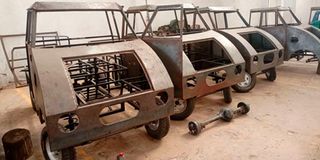Degree papers aside, there’s great value in prior learning

The BJ50 Rickshaw, from Sagak Tech Automakers.
All too often, this leading newspaper, while reporting on innovative micro and small businesses, refers to the owners as school dropouts.
One such case is SagaTech, makers of the now rather famous BJ50 tuk tuk. Article after article refers to Mr Njogu, the innovator, as a school dropout. Yet most innovators in fact find the "average" education less than satisfying and often leave the school system early to pursue their innovations. Microsoft founder Bill Gates is perhaps one of the most famous.
Early this week, Azimio presidential candidate Raila Odinga lent crucial support to recognition of prior learning.
This is a big boost to the effort to recognise the skills that micro and small business owners and artisans have.
Artificial barrier
It recognises that most skills are acquired not theoretically in a classroom, but rather through doing. In addition, it overcomes an artificial barrier created by procurement systems which demand academic qualifications.
Let me return to the BJ50 and homologation. The latter is Kenya Standard 2717, or KS2717, requiring vehicle manufacturers to demonstrate that they will meet European and North American standards. Yet the tuk tuk is produced for use in rugged, farming environments.
Intended as a rural workhorse with a 750kg payload, it has four wheels for improved stability.
Behind the insistence by the Kenya Bureau of Standards on KS2717 is the fear that Mr Njogu and his colleagues do not know what they are doing because they don't have engineering degrees.
Electric cars
Tesla Motors is the leading producer of electric cars in the world today. SpaceX is the leader in private sector space travel.
Both were founded by Elon Musk, who does not have an engineering degree!
That is why recognition of prior learning is key to unlocking the amazing potential of micro enterprises. It is also key to creating a structure of industry that works for Kenya and creates growth.
Unleashing micros begins to solve the problem of jobless growth.
Jobless growth is the bane of many an African economy – from Kenya and South Africa to Tunisia.
In all these economies, the formal sector is based on a traditional economic structure.
Even when these formal sectors are growing, they don't create sufficient numbers of jobs. Worse still, since the informal sector lacks recognition, it struggles to attract capital.
Yet industrial Europe was built on a system of apprenticeship, where skills are developed by doing.
The whole sector is waiting expectantly for the policy to be launched.
@NdirituMuriithi is the Governor of Laikipia County





